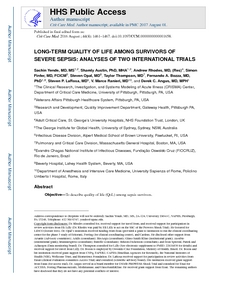Yende, S; Austin, S; Rhodes, A; Finfer, S; Opal, S; Thompson, T; Bozza, FA; LaRosa, SP; Ranieri, VM; Angus, DC
(2016)
Long-Term Quality of Life Among Survivors of Severe Sepsis: Analyses of Two International Trials.
Crit Care Med, 44 (8).
pp. 1461-1467.
ISSN 1530-0293
https://doi.org/10.1097/CCM.0000000000001658
SGUL Authors: Rhodes, Andrew
![[img]](https://openaccess.sgul.ac.uk/109894/1.hassmallThumbnailVersion/nihms753529.pdf)  Preview |
|
PDF
Accepted Version
Available under License ["licenses_description_publisher" not defined].
Download (325kB)
| Preview
|
Abstract
OBJECTIVES: To describe the quality of life among sepsis survivors. DESIGN: Secondary analyses of two international, randomized clinical trials (A Controlled Comparison of Eritoran and placebo in patients with Severe Sepsis [derivation cohort] and PROWESS-SHOCK [validation cohort]). SETTING: ICUs in North and South America, Europe, Africa, Asia, and Australia. PATIENTS: Adults with severe sepsis. We analyzed only patients who were functional and living at home without help before sepsis hospitalization (n = 1,143 and 987 from A Controlled Comparison of Eritoran and placebo in patients with Severe Sepsis and PROWESS-SHOCK, respectively). INTERVENTIONS: None. MEASUREMENTS AND MAIN RESULTS: In A Controlled Comparison of Eritoran and placebo in patients with Severe Sepsis and PROWESS-SHOCK, the average age of patients living at home independently was 63 and 61 years; 400 (34.9%) and 298 (30.2%) died by 6 months. In A Controlled Comparison of Eritoran and placebo in patients with Severe Sepsis, 580 patients had a quality of life measured using EQ-5D at 6 months. Of these, 41.6% could not live independently (22.7% were home but required help, 5.1% were in nursing home or rehabilitation facilities, and 5.3% were in acute care hospitals). Poor quality of life at 6 months, as evidenced by problems in mobility, usual activities, and self-care domains were reported in 37.4%, 43.7%, and 20.5%, respectively, and the high incidence of poor quality of life was also seen in patients in PROWESS-SHOCK. Over 45% of patients with mobility and self-care problems at 6 months in A Controlled Comparison of Eritoran and placebo in patients with Severe Sepsis died or reported persistent problems at 1 year. CONCLUSIONS: Among individuals enrolled in a clinical trial who lived independently prior to severe sepsis, one third had died and of those who survived, a further one third had not returned to independent living by 6 months. Both mortality and quality of life should be considered when designing new interventions and considering endpoints for sepsis trials.
| Item Type: |
Article
|
| Additional Information: |
This is a non-final version of an article published in final form in Yende, S; Austin, S; Rhodes, A; Finfer, S; Opal, S; Thompson, T; Bozza, FA; LaRosa, SP; Ranieri, VM; Angus, DC (2016) Long-Term Quality of Life Among Survivors of Severe Sepsis: Analyses of Two International Trials. Crit Care Med, 44 (8). pp. 1461-1467 |
| Keywords: |
Activities of Daily Living, Adult, Aged, Comorbidity, Disaccharides, Female, Humans, Length of Stay, Logistic Models, Male, Middle Aged, Mobility Limitation, Quality of Life, Sepsis, Severity of Illness Index, Sugar Phosphates, Survivors, quality of life, sepsis, Emergency & Critical Care Medicine, 1103 Clinical Sciences, 1110 Nursing, 1117 Public Health And Health Services |
| SGUL Research Institute / Research Centre: |
Academic Structure > Molecular and Clinical Sciences Research Institute (MCS)
Academic Structure > Molecular and Clinical Sciences Research Institute (MCS) > Cell Sciences (INCCCS) |
| Journal or Publication Title: |
Crit Care Med |
| ISSN: |
1530-0293 |
| Language: |
eng |
| Publisher License: |
Publisher's own licence |
| Projects: |
| Project ID | Funder | Funder ID |
|---|
| UNSPECIFIED | Wellcome Trust | UNSPECIFIED | | R01 GM097471 | NIGMS NIH HHS | UNSPECIFIED |
|
| PubMed ID: |
26992066 |
| Web of Science ID: |
WOS:000380631000002 |
| Dates: |
| Date |
Event |
| 2016-08 |
Published |
|
 |
Go to PubMed abstract |
| URI: |
https://openaccess.sgul.ac.uk/id/eprint/109894 |
| Publisher's version: |
https://doi.org/10.1097/CCM.0000000000001658 |
Statistics
Item downloaded times since 13 Jun 2018.
Actions (login required)
 |
Edit Item |



